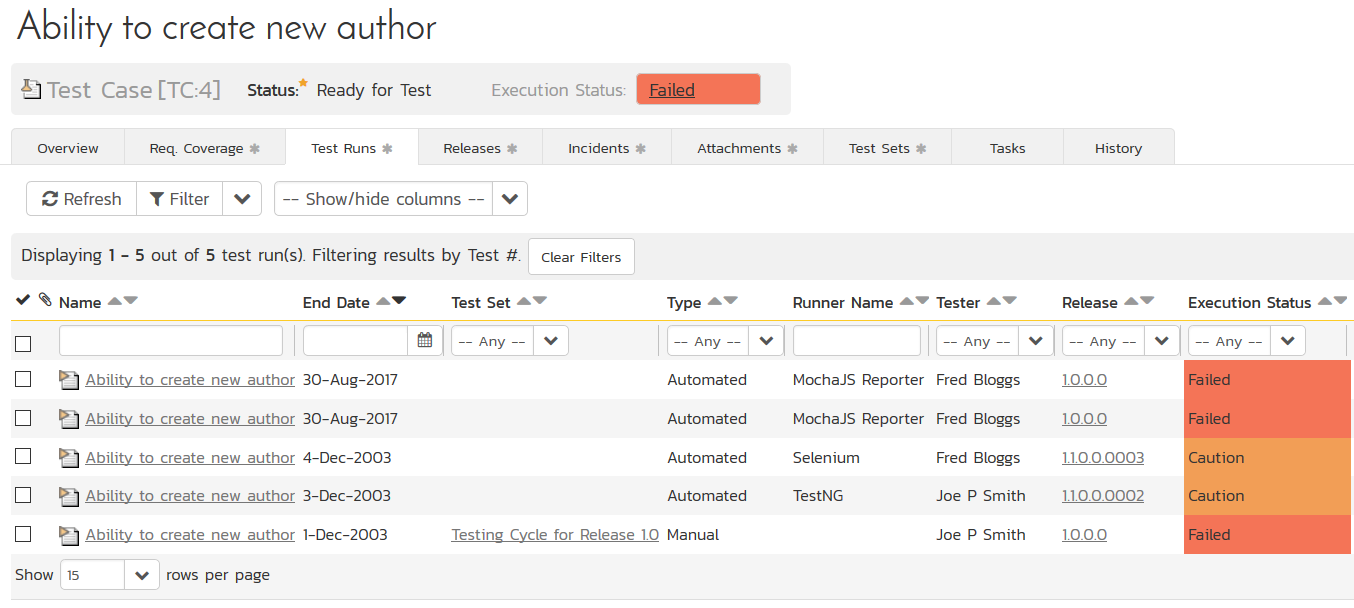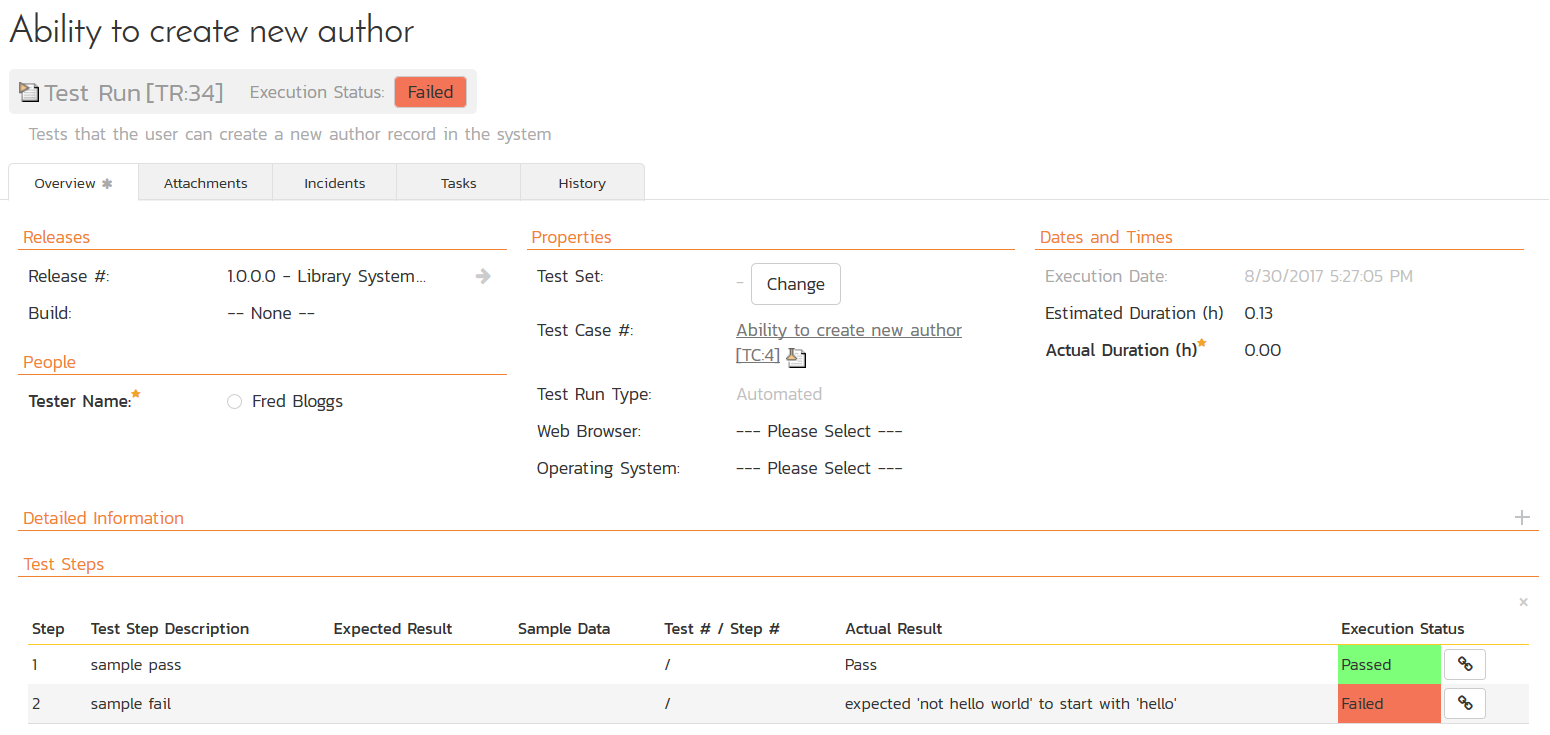Integrating UnitJS & NodeJS¶
UnitJS is an assertion library for JavaScript, running on Node.js or a web browser. It works with various test runner and unit testing frameworks, including Mocha, Karma, Protractor, and QUnit.
SpiraTest currently includes a pre-built extension for the MochaJS test runner and our sample code illustrates it working with UnitJS. However, we supply the source code to the extension, so you can easily adapt it for other runners such as Protractor.
Using the SpiraTest MochaJS Reporter¶
Mocha is a feature-rich JavaScript test framework running on Node.js and in the browser, making asynchronous testing simple and fun. Mocha tests run serially, allowing for flexible and accurate reporting, while mapping uncaught exceptions to the correct test cases.
An example UnitJS test running Mocha looks something like:
var test = require('unit.js');
describe('Example Test', function(){
it('sample pass', function(){
// just for example of tested value
var example = 'hello world';
test
.string(example)
.startsWith('hello')
.match(/\[a-z\]/)
.given(example = 'you are welcome')
.string(example)
.endsWith('welcome')
.contains('you')
.when('"example" becomes an object', function(){
example = {
message: 'hello world',
name: 'Nico',
job: 'developper',
from: 'France'
};
})
.then('test the "example" object', function(){
test
.object(example)
.hasValue('developper')
.hasProperty('name')
.hasProperty('from', 'France')
.contains({message: 'hello world'})
;
})
.if(example = 'bad value')
.error(function(){
example.badMethod();
})
;
});
it('sample fail', function(){
// just for example of tested value
var example = 'not hello world';
test
.string(example)
.startsWith('hello')
.match(/\[a-z\]/)
.given(example = 'you are welcome')
.string(example)
.endsWith('welcome')
.contains('you')
.when('"example" becomes an object', function(){
example = {
message: 'hello world',
name: 'Nico',
job: 'developper',
from: 'France'
};
})
.then('test the "example" object', function(){
test
.object(example)
.hasValue('developper')
.hasProperty('name')
.hasProperty('from', 'France')
.contains({message: 'hello world'})
;
})
.if(example = 'bad value')
.error(function(){
example.badMethod();
})
;
});
});
In this sample, we have one test suite "Example Test" that has two tests -- "sample pass" and "sample fail" inside it. When you run this test using Mocha using the command line:
node ./node_modules/mocha/bin/mocha .\test\example2.js
You get the following:

What we want is to have this test suite report back against a matching test case in SpiraTest.
To do that we need to download and unzip the UnitJS-MochaJS-Reporter.zip file from the Inflectra website and extract the contents to the same location as your test framework. The reporter subfolder contains two NodeJS modules:
-
SpiraReporter.js -- this contains the Mocha custom reporter used for sending the results to SpiraTest
-
SpiraClient.js -- this contains the JavaScript module that sends a test result back to SpiraTest. It is used by SpiraReporter.js but can also be used directly in your code if you want to report back results without using Mocha.
To use this custom reporter with your Mocha test framework, you simply need to do these two things:
-
Add the reporter name to the command line used to invoke Mocha
-
Add some configuration code to your UnitJS test suite to tell Mocha how to connect to your instance of SpiraTest.
The first part is very straightforward, just add the Reporter to your Mocha command line:
node ./node_modules/mocha/bin/mocha .\test\example2.js --reporter .\reporter\SpiraReporter
For the second part, you need to add the following code to your test suite at the top:
var SpiraReporter = require('../reporter/SpiraReporter.js');
//set the SpiraTest options
global.spiraOptions = {
projectId: 1,
testCaseId: 4,
releaseId: 1,
testSetId: null,
login: 'fredbloggs',
apiKey: '{7A05FD06-83C3-4436-B37F-51BCF0060483}',
protocol: 'http',
host: '127.0.0.1',
vdir: 'spira'
};
The second line defines the connection and test case information used for reporting back to SpiraTest. Here's what you need to put in each of the required configuration options:
-
protocol -- this needs to be set to either "http" or "https" depending on how you connect to SpiraTest
-
host -- this needs to be the name or IP address of the host running SpiraTest. For cloud customers, it will be something like mycompany.spiraservice.net
-
port -- this is usually 80 for http and 443 for https unless you are running SpiraTest on a custom port
-
vdir -- this is the name of any path used after the hostname. For example, if your URL is https://demo.spiraservice.net/mysite then the vdir would be "mysite". If your URL is just https://mycompany.spiraservice.net then you can leave the vdir blank or just not set a value for it.
-
login -- this should be a login that has access to the project in SpiraTest with permissions to create test runs.
-
apiKey -- this should be the API Key (also known as the RSS Token) for the login specified
-
projectId -- this should be the numeric ID of the project that the test case belongs to (e.g. if the project is PR56 just use 56)
-
testCaseId -- this should be the numeric ID of the test case that you want this Mocha test suite to report against (e.g. if the test case in question is TC23 just use 23)
In addition, there are two optional configuration parameters you can use:
-
releaseId -- If you would like the recorded test run to be reported against a specific release, iteration or phase in SpiraTest, you need to specify the ID of the release in question (e.g. for release RL18 just use 18)
-
testSetId - If you would like the recorded test run to be reported against a specific test set in SpiraTest, you need to specify the ID of the test set in question (e.g. for test set TX35 just use 35)
With those values set, when you run the test suite using the command line:
node ./node_modules/mocha/bin/mocha .\test\example2.js --reporter .\reporter\SpiraReporter
The results of the test suite will be displayed inside the Mocha console:

When you login to SpiraTest and view the test case being executed, you will now see the automated test runs reported back from Mocha:

Clicking on one of the MochaJS Reporter test runs will bring up a screen that provides the detailed test run report from Mocha:

The Console Output section gives more detailed information:

Congratulations... You are now able to run UnitJS automated tests using Mocha and the SpiraTest custom reporter and have the results be recorded within SpiraTest. The sample test suites example.js and example2.js are provided with the installation.
Have Questions or Need Assistance?¶
If you are an Inflectra customer, please contact our customer support at: - Email: support@inflectra.com - Help Desk: https://www.inflectra.com/Support/
Otherwise, please feel free to post a question on our public forums: - Test Case Integration Forum